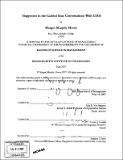Happiness in the catbird seat : conversations with CEOs
Author(s)
Murphy Moore, Margot
DownloadFull printable version (4.584Mb)
Other Contributors
Sloan School of Management.
Advisor
John E. van Maanen.
Terms of use
Metadata
Show full item recordAbstract
Accomplished individuals should, by all modern definitions, be happy. They have achieved the power, authority, influence, and wealth that many in the American capitalist society aspire towards. But what defines happiness once you are there? When you are sitting in Thurber's proverbial "catbird seat," what is happiness? In conversations with 18 senior leaders of Fortune 1000 companies, guided by scripted questions posed by the author, the leaders responded to inquiries about their understanding of happiness, the influencers of happiness, the role of personal happiness in success, and their personal definition of happiness. The conversations, complemented by two standardized questionnaires, developed three thematic components of happiness. Social relationships, personal focus, and a sense of thresholds were revealed as the most consistent dimensions of personal happiness. These themes synthesize much of the existing literature on happiness where happiness is often divided into two definitions: eudonic: happiness derived from virtuosity, and hedonic: happiness derived from pleasure and the avoidance of pain. The conversations combined these theories and integrated life lessons from leadership to produce a theorem of sorts: Happiness exists in the enjoyment of virtuosity. Virtuous pain exists in vain.
Description
Thesis (S.M.)--Massachusetts Institute of Technology, Sloan School of Management, 2007. Includes bibliographical references (leaves 83-87).
Date issued
2007Department
Sloan School of ManagementPublisher
Massachusetts Institute of Technology
Keywords
Sloan School of Management.